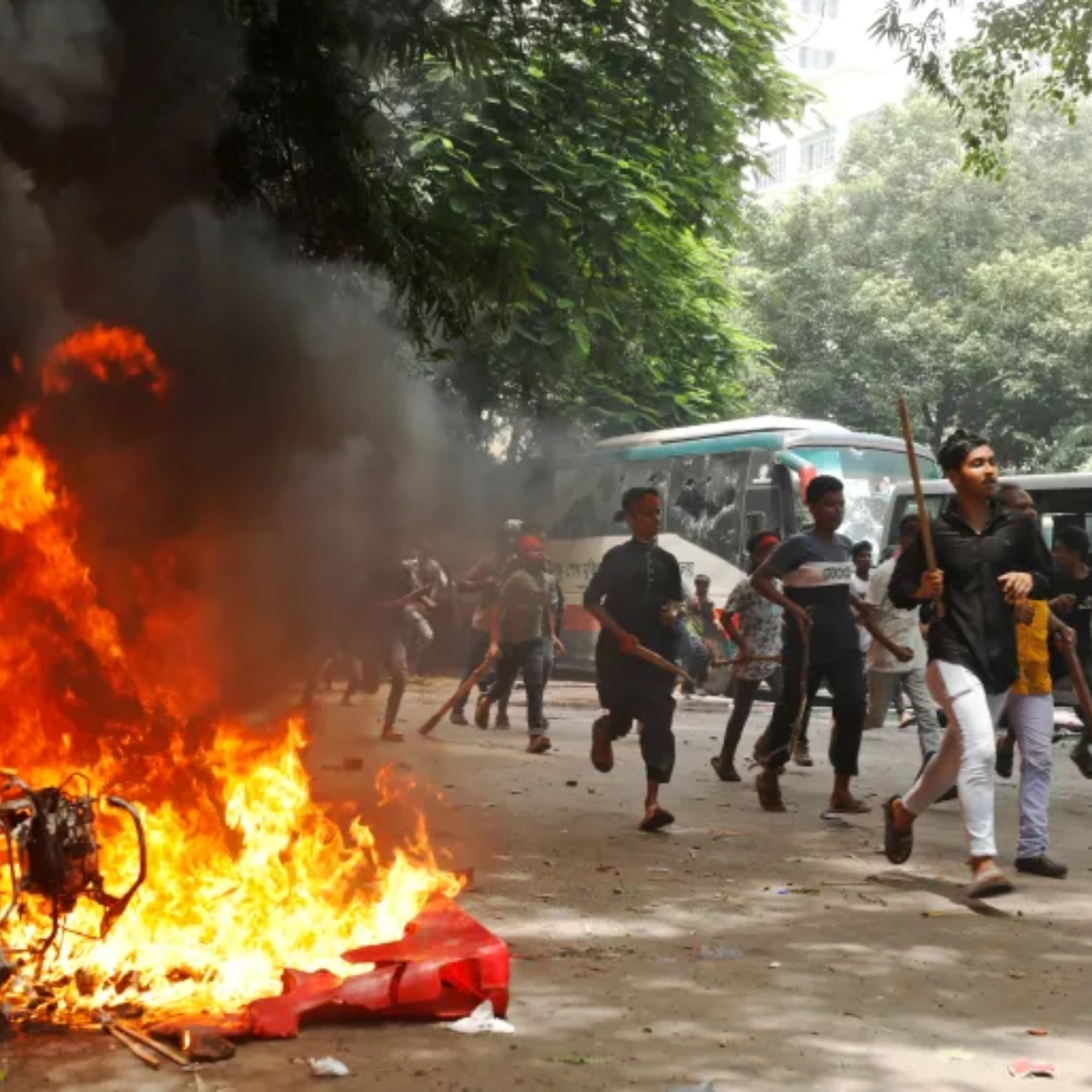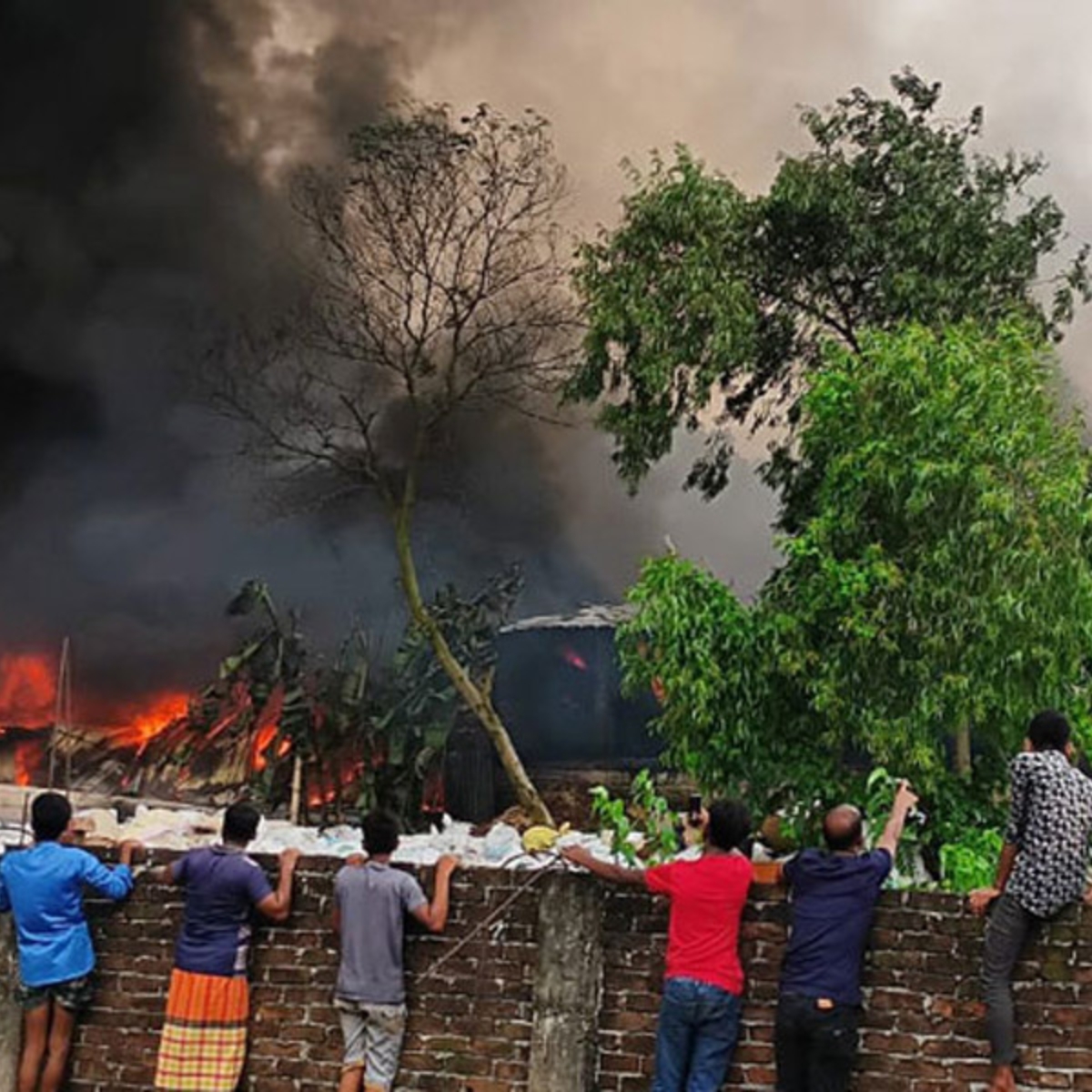In August 2024, following two-years of fermenting discontent, widespread riots led to the ousting of then Prime Minister, Sheikh Hasina; 450,000 arrests, and at least 600 tragic deaths followed. The political crisis that has engulfed Bangladeshi democracy was worsened by extreme flooding which has crippled infrastructure and exacerbated significant existing inequalities and social concerns.

Source: Al-Jazeera
Due to the breakdown in communications infrastructure, and the implementation of curfews, it is difficult to maintain regular employment conditions. The political crisis is likely to cause significant disruption to textile and other supply chains in Bangladesh; workers are exposed to greater human rights risks than ever before, endangering worker security and the uninterrupted functioning of regional supply chains.
Garment brands that source from Bangladesh’s export industries have a critical role to play in engaging with workers to identify evolving risks, and to work with employers to ensure adequate Human Rights Due Diligence (HRDD) practices are implemented at this time.
The Impact of the Crisis on the RMG Sector
The ready made garment (RMG) sector is the backbone of Bangladesh’s economy, amounting for a staggering 82% of Bangladesh’s export income. The government may have fallen, but continued disruption to the garment sector still threatens to bring down the nation’s economy. Collaboration and compromise between all stakeholders is necessary to stabilize Bangladesh’s garment sector, which is in the interest of all stakeholders. Coordinated human rights due diligence processes and tools that facilitate stakeholder engagement have a significant role to play in healing the wounds of this crisis and building towards a fairer, more resilient garment sector.

In September, dissatisfied garment workers burned down a chemicals factory in Kashimpur (Source: Asianews)
The crisis has severely impacted the sector. Salaries have been withheld due to political unrest for three months, since August 5th. This has led to garment workers blocking roads into factories in protest in October. In September, dissatisfied garment workers protesting against unpaid back wages burned down a chemicals factory in Kashimpur. Unrest in the region has led to a closure of just under 200 garment factories, leading to further lay-offs due to lack of work.
Disruption has led to global calls to respect HRDD commitments
Global calls to respect HRDD commitments have been consistent. IndustriALL, a global union representing 50m workers, called for the:
- Protection of wages by ensuring all workers receive their wages for the curfew period;
- No job losses, retrenchment, or harassment of workers;
- Respect and safeguard the safety and rights of all workers and their families;
- Engagement in dialogue with trade unions, particularly regarding labor law reforms, minimum wages, and employment policies;
- Calls for the government of Bangladesh to restore human rights and equity for victims of state violence, including fair compensation and improved workplace safety.
In the wake of the crisis, nine multi-stakeholder organizations, including amfori, and the Ethical Trading Initiative, released a joint statement calling for responsible behavior from brands that source from Bangladesh  following the overthrow of the Government. They urge companies working in Bangladesh to respect the UN Guiding Principles on Business and Human Rights and the ILO Convention.
following the overthrow of the Government. They urge companies working in Bangladesh to respect the UN Guiding Principles on Business and Human Rights and the ILO Convention.
Specifically, they urged businesses acting in the region to carry out meaningful stakeholder engagement to proactively engage risks as the situation evolves, interface with workers and their representatives within a HRDD process, and to use their leverage over suppliers to ensure responsible practices.
Law change represents an opportunity to turn a corner
There is a pressing need to be attentive to human rights and social issues, particularly around labor. Buyers and other interested stakeholders that conduct HRDD in Bangladesh must be sensitive to worker concerns that arise from this complex situation. The Bangladeshi government committed to reforming labor laws by March 2025 at the 352nd ILO convention in Geneva. The EU and well known western retailers and brands have supported the law change. The Minimum Wage Board have also voiced their support for changes to the law that would ensure factories implement fair wage structures, with officials suggesting that the failure of factory owners to pay workers is at the heart of unrest.
While law changes have the potential to calm the situation, the extent of their impact lies in their implementation. If these laws are to come into force, buyers and stakeholders can ensure that they’re properly implemented on the factory floor, and reduce the risk of further unrest and disruption by using digital HRDD tools. These HRDD tools can facilitate better outcomes, building up valuable data while recording and monitoring complaints and outcomes.
Implementing HRDD best practices during the Bangladesh crisis
Effective HRDD systems require proper engagement between workers, employers and factory workers, wider stakeholders such as unions or worker representatives, and buyers. However tensions that might arise between these groups mean it’s important to engage with stakeholders with a strong evidence-base backed up by direct feedback and worker engagement, so that risks can be substantiated and remedied in an objective and timely manner. 
Ulula has an established presence in Bangladesh, engaging 135,000 garment workers. Ulula’s tools are helping garment workers to advance their rights, reducing worker turnover, simplifying compliance with internal and external labor standards, and improving the functioning of Supplier Codes of Conduct. If you’re currently engaged with the Bangladesh supply chain and looking for trustworthy, transparent digital tools that protect and empower workers, minimize HRDD risks, and build more resilient and sustainable supply chains, contact Ulula now.

